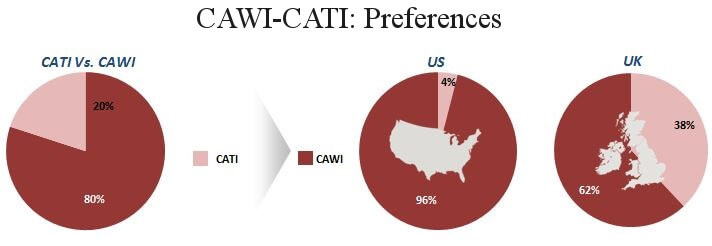Choosing the right market research tools
Modern market research leverages a rich repository of primary research methodologies, including:
- CAWI (Computer Aided Web Interview)
- CATI (Computer Aided Telephone Interviews)
- PAPI (Paper And Pencil Interview)
- CLT (Central Location Test)
- Postal questionnaires, log research
- CAPI (Computer Aided Personal Interview
However, the cost efficiency of your study and reliability of your results depend much on the selection of the right approach. Due to the technological progress, computer-assisted methodologies like CATI and CAWI have emerged as the clear favorites of cost-savvy researchers. When comparing both approaches directly to each other, CAWI takes the lead by margins.

Nevertheless, both have a distinct set of pros and also cons. Let’s take a closer look at them.
CAWI (Computer Aided Web Interviewing)
CAWI describes the broad category of online questionnaires. Market researchers have tested a plethora of variations over the years and discovered multiple viable variations. The most common form is a questionnaire that appears as part of a website or online app. Usually, respondents can access the questionnaires in different ways based on the sample design.
Most variations of the CAWI approach share the following advantages:
- Negligible expenses for print, interviewer, and data input
- Reduced collection time and virtually no input time
- Real-time processing and real-time data follow-up
- Excellent access to certain targets (e.g. net surfers, working population)
- Geographical restrains practically non-existent
- Suppression of skews due to interviewer and input errors
CAWI clearly has an impressive list of advantages. However, it also does have limitations, due to its reliance on internet technology and human-less interactions:
- Respondents are not fully representative of some target groups (e.g. all CAWI respondents have certain access to the internet).
- CAWI makes it difficult to confirm the validity of answers and other important factors including the respondents’ identities.
CATI (Computer Aided Telephone Interviewing)
CATI describes a category of telephonic interviews in which the respondent’s answers are recorded and processed with the help of specialized computer software.
A well designed and properly executed CATI-approach has the following advantages:
- It is quick and convenient for the respondent.
- It only requires a phone at the respondent’s end.
- There are virtually no geographical constraints.
- It is technically reliable.
Despite its overall power, CATI has certain restrictions:
- CATI respondents are not fully representative of some target groups (e.g. all CATI respondents have certain a telephone).
- Questions based around visualizations are impossible.
- Certain sensitive subjects must be avoided to bypass potential skews.
Which one is preferable?
Market research is a complex field aimed at collecting information in the most efficient manner. The question ‘which methodology is the best’ therefore can only be answered in conjunction with details of the target respondents. Two examples:
Example I: Dog-owning university students in the UK
CAWI would be the prime choice for a market research study targeting dog-owning university students in the UK. The internet usage penetration in the UK is around 92.6% (https://www.internetlivestats.com/) with the actual proportion among university students being much higher. We can also assume and that the attributes having internet access and owning a dog have negligible correlational effects.
Example II: Senior citizens in Grenada
In contrast, a study aiming to collect information about elderly people in Grenada would more likely be a sample case for CATI. Grenada’s internet usage penetration is only around 38.8%. Therefore, CAWI might lead to skewed results towards more affluent or progressive households.
The current state of computer-aided interviewing
In many cases, CAWI and CATI apply equally well. SG Analytics conducted a survey to understand the preferences of market researchers. The results of our survey also helped in understanding prevailing CAWI and CATI survey strategies. Read our next article and explore the tricks that professional market researchers deploy for successful computer-aided interviews.









